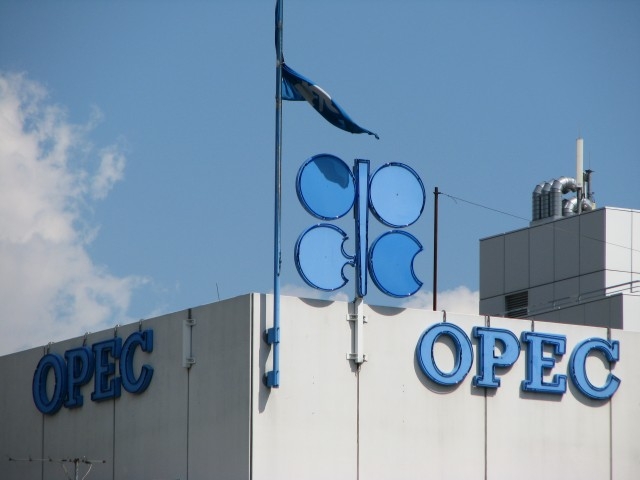OPEC ready to cut supplies in 2013 to support oil prices
 The Organization of Petroleum Exporting Countries on Wednesday decided to maintain its oil output ceiling at 30 million barrels per day, which stands about one mbpd below the cartel's actual production.
The Organization of Petroleum Exporting Countries on Wednesday decided to maintain its oil output ceiling at 30 million barrels per day, which stands about one mbpd below the cartel's actual production.
At a ministerial meeting in Vienna -- where OPEC is based -- its 12 member countries also chose to re-appoint Secretary-General Abdullah El-Badri to head the organisation for another year after failing to agree on a new leader.
In a concluding statement, OPEC said "the biggest challenge facing global oil markets in 2013 is uncertainty surrounding the global economy, with the fragility of the eurozone remaining a major concern."
It added: "World oil demand is forecast to increase slightly during... 2013, (but) this is likely to be more than offset by the projected increase in non-OPEC supply" -- such as from the US.
OPEC's "overall interest is certainty in demand, and nobody can really tell whether this certainty in demand will be fully there," independent energy market analyst Karin Kneissl told AFP after Wednesday's meeting.
OPEC, which includes the world's biggest oil exporter Saudi Arabia among its dozen members, forecast that demand for its crude oil next year was set to contract to 29.7 mbpd -- or about 1.5 mbpd down on current output.
The International Energy Agency, which represents consumers, said on Wednesday that non-OPEC production was expected to rise to 54.2 mbpd in 2013 following "the highest growth rate since 2010."
OPEC members agree that the oil market "is currently well-supplied and demand for the group's crude will fall next year," said Julian Jessop, analyst at the Capital Economics research group.
"The US, Canada and Mexico combined now produce more oil than the total of... (OPEC's) Saudi Arabia, Iraq and Iran," he added.
A weakening of demand for OPEC oil risks weighing on high crude prices, despite a background of Middle East unrest, notably over Iran's disputed nuclear programme.
Benchmark crude oil prices rose above $108 a barrel Wednesday on supply concerns after OPEC reported a drop in crude production last month, traders said.
OPEC on Wednesday said its members "would, if necessary, take steps to ensure market balance and reasonable price levels for producers and consumers."
While analysts said OPEC would cut output in the coming months, its members would be wary of stripping back too much for fear of sending prices too high, hurting economic recovery.
"Most members states in the exporting group will be happy with the current market balance and price levels, while fearing that falling production could see a further price rise and hurt already struggling demand growth into 2013," said Andrey Kryuchenkov, an analyst at VTB Capital financial group.
Long-term meanwhile, a spike in shale oil and gas production risks weighing on prices of conventional crude, according to industry experts. The IEA recently forecast that the US would become the world's biggest oil producer by 2017 thanks to an explosion in hard-to-reach energy trapped in shale, or sedimentary rock.
"According to the numbers we have seen, we think there will be competition" from US shale, UAE Energy Minister Mohammad bin Dhaen al-Hamli said in Vienna this week.
"We will do everything possible to protect our (OPEC) interests," he added.
What the stars mean:
★ Poor ★ ★ Promising ★★★ Good ★★★★ Very good ★★★★★ Exceptional
Related Contents
Latest News
More News
- 0.1 per cent tax proposed on each transfer of digital assets (February 05, 2026 | 17:27)
- Ministry of Finance tightens policy delivery at start of year (February 05, 2026 | 17:26)
- Vietnam steps up market reforms as FTSE Russell reviews upgrade progress (February 05, 2026 | 17:20)
- 2025 profits mixed amid strong energy and farming results (February 05, 2026 | 17:18)
- Cashless payments hit 28 times GDP in 2025 (February 04, 2026 | 18:09)
- SSIAM and DBJ launch Japan Vietnam Capital Fund (February 04, 2026 | 15:57)
- Banks target stronger profits, credit growth in 2026 (February 04, 2026 | 15:43)
- Vietnam on path to investment-grade rating (February 03, 2026 | 13:07)
- Consumer finance sector posts sharp profit growth (February 03, 2026 | 13:05)
- Insurance market building the next chapter of protection (February 02, 2026 | 11:16)

 Tag:
Tag:




















 Mobile Version
Mobile Version